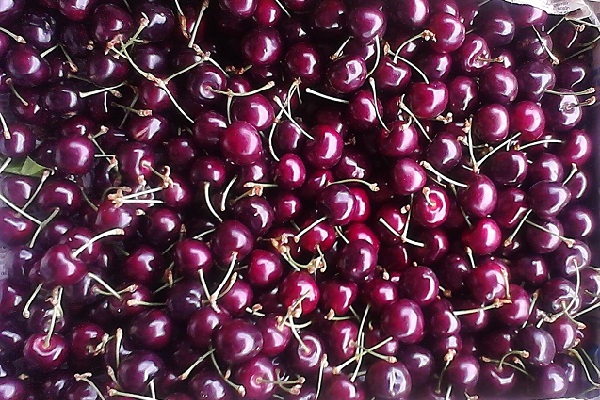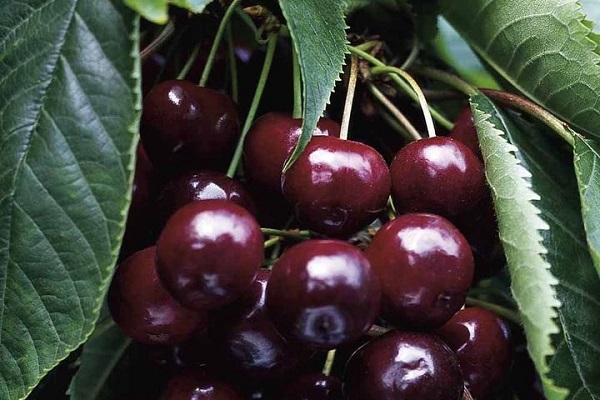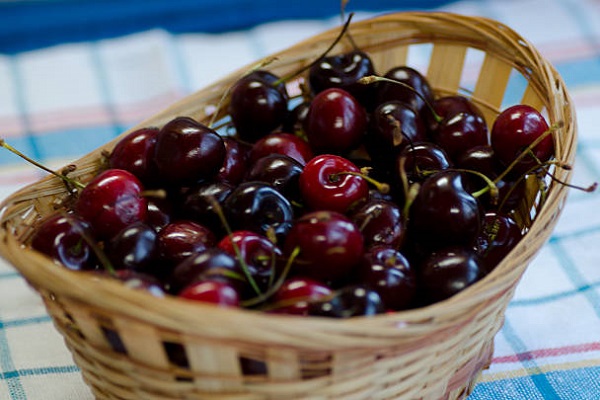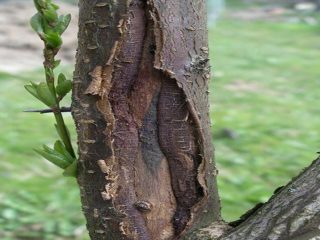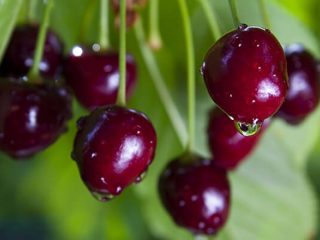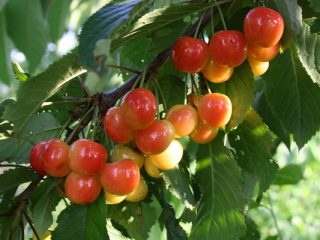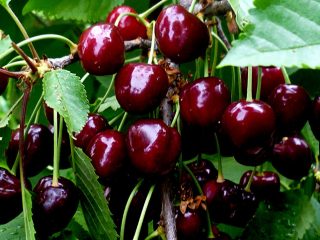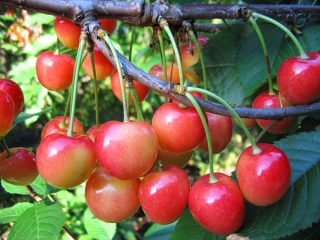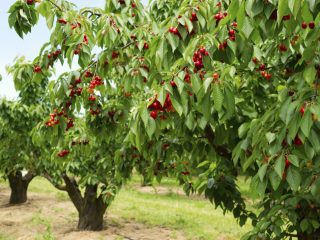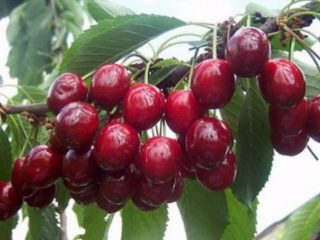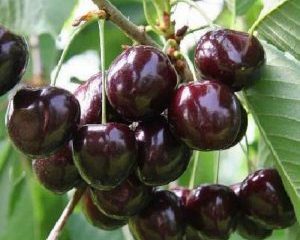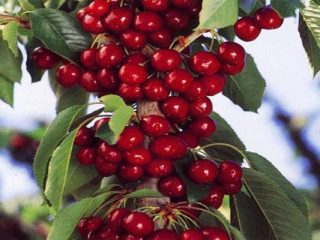Content
Every year the number of fans of the Napoleon cherry variety is growing rapidly. The plant is cultivated as a supplier of tasty, healthy berries, which are characterized by juiciness and sweetness.
History of variety selection
Cherry Napoleon is one of the old varieties bred by European breeders in the 19th century. The rootstock for Napoleon was the Magaleb cherry Antipka.
Description of the cherry variety Napoleon
Cherry Napoleon is a high-yielding, late-ripening variety. A tree of strong growth forms a dense, spherical, well-leafed, spreading crown. It can reach a height of up to 5–6 meters. When the plant is young, intensive growth is observed, and at the time of fruiting it is moderate. The tree is decorated with large leaves, painted dark green, in the shape of an elongated oval with a pointed tip, without pubescence.
They delight with their flowering in early April. The flowers are medium-sized and have saucer-shaped petals, collected in inflorescences of 2–3 pieces. The large dark red fruits attract attention, which, when ripe, acquire a black color. The weight of one berry is up to 6.5 g. The fruits have an irregular oval shape. Under the thick skin there is pulp, characterized by density and medium juiciness. Sweet and sour taste with a pleasant bitterness. Tasting score – 4.9 points out of 5.
Another late-ripening, heat-loving European variety is the pink Napoleon cherry. It is rarely cultivated in central Russia, since the crop is highly susceptible to high frosts. Therefore, the variety does not take root well and produces a poor harvest in areas with low air temperatures. And in the southern latitudes it gives a rich harvest of delicious bright pink cherries, distinguished by their large size and density of pulp.
There is no yellow Napoleon cherry; there are only two types of this variety - black and pink.
Characteristics of the variety
When choosing Napoleon cherries, you need to familiarize yourself with the characteristics of the variety, which includes information about the crop’s resistance to low temperatures, excess moisture, diseases and insects, as well as information about the timing of flowering and ripening of berries.
Winter hardiness of cherry Napoleon Black and Pink
The Napoleon cherry is characterized by an average yield, the plant can withstand down to -30 C. And also thanks to the deep root, which allows it to receive moisture from the lower layers of the earth on hot days, the crop can withstand dry weather.
Who pollinates the Napoleon cherry?
The cherry variety Napoleon is declared as self-fertile.But for a high-quality harvest, you can plant the varieties Valery Chkalov, Early Mark, Zhabule, and Drogana Zheltaya nearby. For large plantings, it is recommended to form seedlings in paired rows.
Productivity and fruiting
Fruiting of this late variety begins 4–5 years after planting. The harvest can be harvested in the last days of June. The average yield of the Napoleon cherry variety is 30 kg, and when grown in the southern regions, up to 70 kg per tree.
Area of application of berries
Cherry Napoleon belongs to the universal varieties. Berries are not only an excellent dessert product, but also a high-quality raw material that is used to make jam, compote, dried fruit, as well as for various processing and freezing. Traditional healers widely use the culture, since infusions and decoctions from the berry can strengthen and tone the body, improve immunity and help in the treatment of many diseases.
Resistance to diseases and pests
Cherry Napoleon Black is resistant to fruit rot, moniliosis, coccomiosis. And among the pests that can be found in a cherry orchard are cherry flies, aphids, and sawflies. The Napoleon Pink cherry is also susceptible to rot, although it has good resistance to fungal diseases, and is almost not damaged by such a common pest as the cherry fly.
Advantages and disadvantages of the variety
The Napoleon cherry variety is endowed with a lot of advantages, thanks to which it arouses the interest and attention of gardeners. Positive characteristics include:
- high productivity;
- excellent keeping quality; the harvest can be stored for up to 14 days in a cool place;
- ability to withstand transportation over long distances without loss of presentation;
- versatility; the berries are beautiful fresh, dry, wrapped for the winter and frozen;
- a source of useful substances that can protect the human body from many diseases.
With all the many advantages, the Napoleon cherry variety also has some disadvantages:
- intolerance to low temperatures;
- poor resistance to pests such as cherry flies.
Landing Features
Before planting Napoleon cherries, you need to take into account all the needs of the crop for its normal growth, proper development and yield formation.
Recommended timing
Napoleon cherries can be planted in spring and autumn. Planting in spring should be done before the buds swell, since a tree planted later will be sick and may not take root. Autumn is also considered a favorable time for planting. Before winter sets in, the roots will have time to deepen and take root. And with the arrival of spring, intensive growth and development of cherries will be observed.
Choosing a suitable location
Napoleon cherry is demanding in terms of growing conditions; it does not tolerate wet and cold soils and needs a huge amount of heat. Groundwater must be at least 2 m, and the area must be protected from drafts and shading. The plant loves nutritious soil composition, so you should choose moist soil with good drainage and sufficient water resistance and optimal acidity.
What crops can and cannot be planted nearby?
Cherry Napoleon is quite whimsical in choosing plants for its neighbors. The best solution would be to plant cherries, cherries, grapes, rowan, and hawthorn nearby. But the apple tree, plum tree, and cherry plum will shade the cherry tree, so they should be planted at a distance of 5–6 meters.
Selection and preparation of planting material
When purchasing planting material, you need to pay attention to its appearance. The Napoleon cherry seedling should be no older than 3 years, the bark should have an even color, without mechanical or thermal damage. The presence of kidneys is a must. The root system should have 3 roots, 0.2 m each. If the root is brown when cut, then it is damaged by frost, and such a seedling should not be purchased.
Landing algorithm
An important criterion for cultivation, on which the regularity of fruiting and the quality of the harvest directly depends, is correct planting.
Stages of the Napoleon cherry planting process:
- Prepare the area for planting in advance by digging it up and clearing it of weed and fertilized well.
- Make planting holes, keeping a distance of 3–4 m between them.
- The bottom of the pit should be equipped with fertile black soil mixed with a complex set of fertilizers.
- Insert a peg, which will serve as a reliable support during the growth process.
- When installing seedlings, you need to orient its root collar in the southern direction, and it should also rise slightly above the ground surface.
- Cover with soil substrate, compacting thoroughly to avoid voids.
- After planting, water with warm water and mulch the soil near the tree trunk with peat or humus.
Proper planting will have a positive effect on yield growth and the development of the tree as a whole.
Aftercare for cherries
In order for a full-fledged, high-quality harvest of Napoleon cherries to be formed, it is enough to perform such important procedures as:
- Watering. It is necessary to properly organize watering, moistening the soil and maintaining it in an optimal state for the normal development of Napoleon cherries.The plant needs water after flowering, during the formation and filling of fruits, and also during dry periods, it is necessary to saturate the soil to a depth of 40 cm. It is advisable to water in the fall to saturate the plants with moisture before the cold season.
- Trimming. Provides for shortening annual shoots, pruning incorrectly located branches directed into the crown, as well as eliminating damaged, dry and frozen branches. After pruning, it is necessary to treat the cut areas using garden varnish for rapid healing and prevention of disease and insect infestation.
- Top dressing. To improve the growth of crop shoots, it is necessary to provide it with the necessary nutrients in sufficient quantities. For these purposes, add fertilizers using organic and mineral compounds.
- Preparing for winter. Winter shelter is needed if the crop is grown in a harsh climate. In rare cases, shoots may freeze, but Napoleon cherries show rapid recovery of parts of the tree damaged by frost.
Caring for cherries is simple and can be done by all gardeners who want to grow them. It is important to carry out all the activities, and, feeling cared for, it will grow and develop faster, giving it delicious berries.
Diseases and pests, methods of control and prevention
Cherries of the Napoleon variety must be protected from the cherry fly and other parasites that intensify their activity after the winter period. And also during this period, you need to constantly inspect the plant, since in the spring it can easily catch a dangerous disease, such as coccomycosis, fruit rot, moniliosis.
Prevention of diseases and pests consists of spring treatment of trees using biological products and insecticides. Work should be carried out in April, before the sap begins to flow.
To protect cherries, it is necessary to spray using Bordeaux solution or azophos, and to achieve maximum effect, combine the use of these products by alternating them.
Conclusion
The Napoleon cherry variety is loved by many gardeners because it pleases with its bright taste. By following all agrotechnical cultivation techniques and following care recommendations, you can get a high-quality harvest of sweet and juicy berries.
Reviews
Summer is considered a great time for sweet lovers, of which I am one. After all, during this period I can satisfy my craving for my favorite treat without harm to my health. Therefore, I decided to plant a cherry orchard in my garden. I chose the Napoleon cherry variety, which was undeservedly forgotten. Its characteristics, advantages, disadvantages, biological characteristics completely satisfy me.


